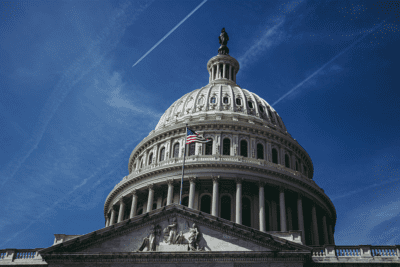
Apprenticeship Transformation Passes the House: What to Know
February 10, 2021
At a Glance
The National Apprenticeship Act of 2021 will provide an influx of funding to modernize apprenticeship and create opportunities for millions of Americans.
JFF is proud to endorse the National Apprenticeship Act of 2021, which would provide an influx of funding to modernize apprenticeship and create new career opportunities for millions of Americans.
The bill, HR 447, passed the U.S. House of Representatives on February 5 in a bipartisan 247-173 vote. It now moves on to the Senate.
Here’s what you need to know about HR 447 as we await Senate action.
It Brings Apprenticeship Into the Modern Era
The National Apprenticeship Act has not been reauthorized since it was first passed by Congress in 1937. The new legislation makes critically important changes to expand and streamline apprenticeship for the modern era while preserving the job quality and labor standards that have made Registered Apprenticeship one of the most successful workforce development models in the nation. The bill focuses solely on Registered Apprenticeships and does not address the Industry-Recognized Apprenticeship Program (IRAP) model.
The considerable expansion of apprenticeship, youth apprenticeship, and pre-apprenticeship will open doors to the promise of apprenticeship for millions of Americans.
It Invests $3.5 Billion in the Apprenticeship System
In 2014, the Obama-Biden administration began the transformation of the Registered Apprenticeship system. Since then, the U.S. has invested over $1 billion in apprenticeships. This included a first-ever congressional appropriations and a patchwork of various grant programs, which has resulted in 1 million new apprentices over the last seven years.
HR 447 creates a more sustained funding model, calling for the federal government to invest more than $3.5 billion in the Registered Apprenticeship system over the next five years. This includes $400 million for apprenticeship programs in the 2022 fiscal year, which begins October 1, 2021, and increases of $100 million every year through the 2026 fiscal year. The bill also increases funding for state apprenticeship agencies from $75 million a year in 2022 to $115 million in 2026.
It Will Create 1 Million New Apprenticeship Opportunities, With a Focus on New Occupations and New Populations
HR 447 includes a number of measures designed to expand apprenticeship and make it more responsive to the demands of the modern labor market.
For example, it would create a grant initiative called Modernizing Apprenticeship Programs for the 21st Century to support the expansion of current registered pre-apprenticeship, youth apprenticeship, and apprenticeship programs and the creation of new programs. The goals of that effort would include expanding apprenticeship beyond the skilled trades and into new occupations and industry sectors and broadening and diversifying the population of workers who participate in apprenticeships.
The legislation also establishes a national framework for engaging employers and expanding apprenticeship opportunities for women, people of color, veterans, and people who may face barriers to employment, including people with disabilities and formerly incarcerated individuals. To help achieve those goals, it calls for added resources, such as emergency grants for supports such as broadband internet access and child care and transportation services.
Additionally, the bill aims to expand apprenticeship into new industry sectors and occupations, including health care, advanced manufacturing, IT, cybersecurity, education and early childhood education, computer science, environmental protection, hospitality and tourism, renewable energy, and media and entertainment It also supports apprenticeships for occupations that will play key roles in the nation’s recovery from the COVID-19 crisis.
These efforts are expected to result in nearly 1 million new apprenticeship opportunities.
It Authorizes the Office of Apprenticeship and Codifies Regulations
HR 447 permanently authorizes the U.S. Department of Labor’s Office of Apprenticeship (OA), which will provide technical assistance on best practices for promoting diversity in apprenticeship, support industry and equity intermediaries that seek to advance apprenticeship, and bring together employers, labor unions, joint labor-management organizations, educational institutions, and industry representatives for apprenticeship initiatives.
The legislation also codifies the roles and responsibilities of State Apprenticeship Agencies (SAA)—enumerating the steps an SAA must follow when submitting an apprenticeship plan to the OA, among other things—and it authorizes funds to support SAA activities.
The bill also creates an interagency agreement between the U.S. Departments of Labor and Education to support the creation and expansion of youth apprenticeships, college consortia, and data-sharing agreements in order to build greater alignment between formal educational programs and apprenticeship. Amendments to the bill expand the scope of collaborations between apprenticeship programs and Title I schools, Temporary Assistance for Needy Families programs, the Department of Justice, the Bureau of Prisons, and the Office of Juvenile Justice.
HR 447 also permanently authorizes the National Advisory Committee on Apprenticeships, which is comprised of approximately 30 individuals representing labor unions, employers, and the public.
And finally, the bill contains several provisions related to regulations and standards for apprenticeships. For example, it aims to ensure that there is equal opportunity for participation in national programs and it codifies and streamlines standards for apprenticeship agreements and program registration.
It’s Not Final Yet
HR 447 has passed the House of Representatives. It next goes to the U.S. Senate Committee on Health, Education, Labor, and Pensions (HELP).
JFF applauds the bipartisan advancement of HR 447 to support a robust apprenticeship system. This legislation is critical to our nation’s economic recovery and will support the investments in infrastructure and U.S. manufacturing proposed by the Biden administration. The considerable expansion of apprenticeship, youth apprenticeship, and pre-apprenticeship will open doors to the promise of apprenticeship for millions of Americans. We urge the Senate to take quick action on this vitally important and modernized legislation.
Related Content

Center for Apprenticeship & Work-Based Learning
This tried-and-true training model has been around for so long because it works. JFF is a leader in expanding apprenticeship and work-based learning to new industries and professions. This tried-and-true training model has been around…
